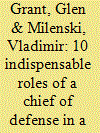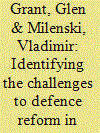| Srl | Item |
| 1 |
ID:
181993


|
|
|
|
|
| Summary/Abstract |
New democracies face significant difficulty in understanding the position of the Chief of Defense (CHOD) and its difference from the traditional/historical role of Chief of the General Staff (CGS). Many of those states attempted to transition from CGS to CHOD upon the advice from Western allies. This move usually followed critical failures in the defense systems. These failures often occurred after bad political decisions regarding the armed forces because the political leadership was in the dark about their true condition. The role of the CHOD, as envisaged and implemented in most long-standing democracies, is designed both to solve this deficiency and to ensure that the armed forces are fit for the future. This article outlines how and why this is the case and identifies precisely what it is that a CHOD should do.
|
|
|
|
|
|
|
|
|
|
|
|
|
|
|
|
| 2 |
ID:
161005


|
|
|
|
|
| Summary/Abstract |
The authors have over 50 years' experience of working on defence in Central and Eastern Europe. They have been intimately involved in trying to reform over 10 national defence organisations including Ukraine. During this work, they often faced intractable resistance and scepticism or conversely, apparent unbounded support, but following this, a complete lack of any actual implementation work by officials. This paper addresses some of the findings and observations identified by the authors that appear to cause these responses and the consequent failure of reform. A new research approach has been taken by using the business and culture tools from Schein, Hofstede and Kotter to try and unravel the underlying causality of that failure. The second part of the paper produces a new process for change based upon the research conclusions to help other advisers and consultants working on reform in the post communist defence arena.
|
|
|
|
|
|
|
|
|
|
|
|
|
|
|
|
| 3 |
ID:
164705


|
|
|
|
|
| Summary/Abstract |
The latest Russian strategic level field-exercise, VOSTOK-2018, grew notorious with its officially reported overwhelming numbers of participating troops, pieces of equipment moved, units maneuvered, and even the states involved – China was in, too! Nonetheless, this exercise again raises an important point that has not registered in most analyses, i.e. the rarely asked question if Russians are at all capable of, or willing to, apply free-play in the conduct of the field-exercise, instead of their infamous highly-scripted military exercises, designed to impress the VIP visitors, rather than train troops and grow commanders.
|
|
|
|
|
|
|
|
|
|
|
|
|
|
|
|